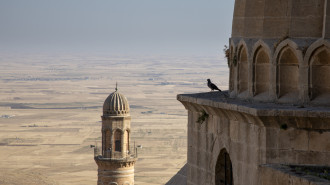Sudan opposition demand president Bashir steps down
Sudan's presidency declined on Wednesday to receive a petition signed by the opposition demanding that President Omar al-Bashir steps down amid nationwide protests over fuel subsidy cuts.
The heads of a coalition of opposition parties brought the petition to the presidential palace on Wednesday morning, but security agents told them there was no one available to receive it, the spokesperson for the Sudanese Communist Party told The New Arab.
Fathy Fadl added that security forces then cordoned his party's headquarter, where the coalition members convened to discuss the next step.
The petition, signed by 23 opposition parties and groups, proposed the formation of a transitional government that would hold a national conference for all political parties, as well as begin working on ending conflict and delivering aid to war zones.
It also cited "grave mistakes" made by Bashir's regime since he came to power in 1989, which they argued led to the separation and independence of South Sudan in 2011, as well as the ongoing conflict in Darfur and South Kordofan and the country's ailing economy.
Nationwide strike
Sudan has seen weeks of sporadic protests over fuel subsidy cuts, which have led to a sharp rise in the cost of other goods, including medicines.
On Wednesday, anti-riot police fired tear gas and confiscated banners as demonstrators including lawyers and journalists staged anti-government rallies.
Sudanese authorities have cracked down on protests in an attempt to prevent a repeat of the deadly unrest that followed a previous round of subsidy cuts in 2013.
Dozens of people were killed at that time when security forces crushed large street demonstrations, drawing international condemnation.
Wednesday's demonstrations came after the end of a three-day nationwide strike called by several opposition groups, which received a mixed response.
Authorities have already arrested more than a dozen opposition politicians in recent weeks, and also cracked down on newspapers critical of subsidy cuts.
Press Freedom
Members of the powerful National Intelligence and Security Service (NISS) have seized entire print runs of several dailies that reported the opposition strike call or questioned the cuts.
Authorities have also halted broadcasts by the privately owned Omdurman Channel, accusing it of operating without a licence, a charge its owner denied.
To protest the crackdown on newspapers, members of the media staged a small demonstration in central Khartoum on Wednesday wearing "Journalists on strike" badges.
Twitter Post
|
"The authorities are harassing us and restricting our freedom of speech," said one journalist, a member of the Sudanese Journalists' Network, an unofficial group that advocates free speech.
Media in Sudan are frequently targeted for their reporting, and journalists frequently complain of harassment from the authorities.
NISS often confiscates the entire print runs of newspapers over articles it deems offensive, rarely explaining why.
Earlier this month, Sudanese security agents seized every copy of three opposition newspapers, including al-Tayyar, after they reported a rise in the country's fuel prices.
"Security agents came to our printers early this morning and took all copies of today's edition without giving any reason," Mirgani said at the time.
In September 2015, all copies of al-Khartoum and al-Sudani newspapers were confiscated after they reported critical stories about water poisoning in the country's south.
The country regularly ranks near the bottom of international press freedom indexes.
It ranked 174 out of 178 countries on Reporters Without Borders' 2016 international press freedom index.
Agencies contributed to this report
![Omar al-Bashir [Gallo] Omar al-Bashir [Gallo]](/sites/default/files/styles/large_16_9/public/media/images/98330AB5-33F5-47C5-80A1-0DC78845BC2D.jpg?h=d1cb525d&itok=ZUDDITJQ)






 Follow the Middle East's top stories in English at The New Arab on Google News
Follow the Middle East's top stories in English at The New Arab on Google News
![President Macron was at the game to show 'solidarity' [Getty]](/sites/default/files/styles/image_330x185/public/2024-11/GettyImages-2184064735.jpg?h=199d8c1f&itok=yXTymeCt)
![Israel demolished homes in the Silwan area [Getty]](/sites/default/files/styles/image_330x185/public/2024-11/GettyImages-2183868368.jpg?h=199d8c1f&itok=TweR8vd0)
